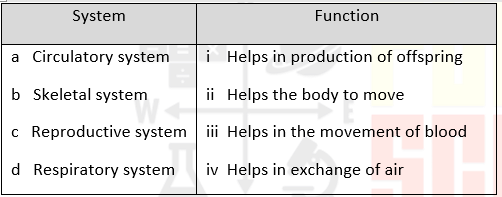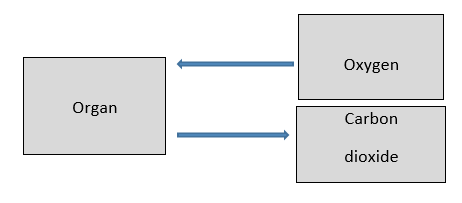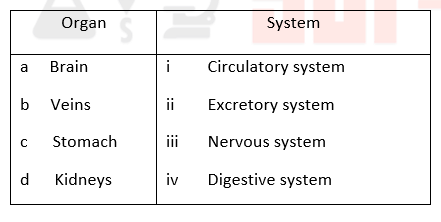-
To enjoy a sweet candy, it must be placed in which part of the tongue?
- ✔ Front
- ✘ Middle
- ✘ Innermost
- ✘ Below
-
Which of the following action is controlled by the nervous system?
- ✘ Speaking
- ✘ Seeing
- ✘ listening
- ✔ All of these
-
Which of the following is required by our body?
- ✔ Oxygen
- ✘ Urine
- ✘ Sweat
- ✘ Carbon dioxide
-
Which organ of our body belongs to both the respiratory and the excretory system?
- ✔ Lungs
- ✘ Skin
- ✘ Kidneys
- ✘ Intestine
-
Pooja has a blindfold and is playing with her friends in a playground. She has to touch her her friends who are moving around her clapping their hands. Which of the following senses helps her to move?
- ✘ Sense of touch
- ✔ Sense of hearing
- ✘ Sense of speech
- ✘ Sense of smell
-
Which of the following systems gives shape to our body?
- ✘ Muscular system
- ✘ Nervous system
- ✔ Skeletal system
- ✘ Circulatory system
-
Which of the following carries oxygen to all the parts of the body?
- ✘ Brain
- ✘ Muscles
- ✔ Blood
- ✘ Nerves
-
Which sense organ will the child use to read the book
Add description here!
- ✔ Eyes
- ✘ Nose
- ✘ Tongue
- ✘ Ears
-
Match the following and select the correct answer.

- ✘ a – iii, b – iv, c – i, d – ii
- ✔ a – iii, b – ii, c – i, d – iv
- ✘ a – iv, b – iii, c – ii, d – i
- ✘ a – iii, b – i, c – iv, d - ii
-
Which of the following body parts are called ‘Gateways of knowledge’?
- ✘ fingers
- ✔ Sense organs
- ✘ Legs
- ✘ Hands
-
Meera observed a fish and concluded that the fish was no longer alive. Which observation allowed her to draw such a conclusion?
- ✔ It did not respond to touch
- ✘ It did not respond to call
- ✘ It was heavy
- ✘ None of the above
-
Which of these can be found in our mouth?
- Teeth
- Saliva
- Tongue
- ✘ 1 and 2 only
- ✘ 2 and 3 only
- ✘
- ✘ 1 and 3 only
- ✔ 1, 2, 3
-
Observe the flow chart given below. It represents an organ which takes in oxygen and given out carbon dioxide.

Identify the organ.
- ✘ Small intestine
- ✘ Kidneys
- ✔ Lungs
- ✘ Stomach
-
Which of the following processes produce energy
- ✔ Digestion
- ✘ Respiration
- ✘ Melting
- ✘ Evaporation
-
Which of the following carries oxygen to all parts of the body?
- ✘ The brain
- ✘ The muscles
- ✔ The blood
- ✘ The lungs
-
Which of the following sense organs is able to detect sense of touch?
- ✘ Tongue
- ✘ Ear
- ✔ Skin
- ✘ Eye
-
Match each of the following organs with its corresponding system?

- ✘ a – iii, b – ii, c – iv, d – i
- ✘ a – iii, b – i, c – ii, d – iv
- ✔ a – iii, b – i, c – iv, d – ii
- ✘ a – i, b – iii, c – iv, d - ii
-
Which of the following systems ensure that all parts of the body receive enough oxygen?
(P) Respiratory system
(Q) Digestive system
(R) Circulatory system
- ✘ P only
- ✘ Q only
- ✔ R only
- ✘ Q and R only
-
__________________ organ is affected when a person has a disease of the excretory system.
- ✘ Large intestine
- ✘ Heart
- ✔ Kidneys
- ✘ Stomach
-
Digestion is the breaking up of food material into simpler forms. In the human body, where does digestion START?
- ✔ Mouth
- ✘ Stomach
- ✘ Food pipe
- ✘ Large intestine
-
Identify the correct pair.
- ✘ Brain – Excretory system
- ✔ Lungs – Respiratory system
- ✘ Heart – Nervous system
- ✘ Stomach – Circulatory system
-
Which organ helps to pump blood all over the body?
- ✔ Heart
- ✘ Lungs
- ✘ Kidneys
- ✘ Consuming food
-
____________________ take in oxygen and given out carbon dioxide.
- ✘ Small intestine
- ✘ Kidneys
- ✔ Lungs
- ✘ Stomach
-
Identify the odd one out.
- ✔ Nerves
- ✘ Blood
- ✘ Blood Vessels
- ✘ Heart
-
What controls our activities of seeing, hearing, learning, thinking and feeling?
- ✘ Skeletal system
- ✘ Muscular system
- ✔ Nervous system
- ✘ Circulatory system
-
Inhaled air reaches our lungs through
- ✘ tongue
- ✘ food pipe
- ✘ blood
- ✔ wind pipe
-
Which organs are protected by the rib cage?
- ✔ Heart
- ✘ Liver
- ✘ Brain
- ✘ Both (A) and (B)
-
Which of the following organ is NOT a part of digestive system?
- ✘ Stomach
- ✔ Heart
- ✘ Mouth
- ✘ Gullet
-
Which organ system helps us in moving about and in doing different kinds of work?
- ✔ Muscular system
- ✘ Nervous system
- ✘ Respiratory system
- ✘ Circulatory system
-
Which of the following organs are protected by the rib cage
P – Heart Q – Liver
R – Brain S – Lungs
- ✘ P and Q
- ✘ Q and R
- ✘ P, Q and R
- ✔ P and S
-
Look at the list below.
- Collar bone
- Rib
- Knee cap
- Backbone
To which body system do the items in the list belong?
- ✔ Skeletal
- ✘ Circulatory
- ✘ Digestive
- ✘ Muscular
-
Identify the body system that work together to get rid of carbon dioxide produced in our body Cells.
(i) Circulatory (ii) Digestive
(iii) Nervous (iv) Respiratory
- ✘ Only (ii) and (iv)
- ✔ Only (i) and (iv)
- ✘ Only (i) and (ii)
- ✘ Only (I), (iii) and (iv)
-
Which of these organs is a part of nervous system?
- ✘ Kidney
- ✘ Stomach
- ✔ Brain
- ✘ Heart
-
Match the sense organs in Column – I to their function in Column – II.
| | Column – I | | Column – II |
| A | Ears | i | Taste |
| B | Nose | ii | Touch |
| C | Skin | iii | Smell |
| D | Tongue | iv | Hear |
- ✘ a – i; b – ii; c – iii; d – iv
- ✘ a – ii; b – iii, c – iv; d – i
- ✔ a – iv; b – iii, c – ii, d – i
- ✘ a – iv; b – ii, c – iii, d – i
-
Which type of stimulus is NOT detected by our skin?
- ✘ Heat
- ✘ Cold
- ✘ Pain
- ✔ Light


